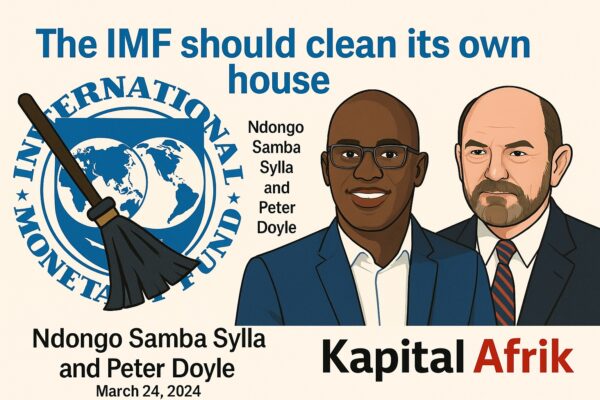By Ndongo Samba Sylla and Peter Doyle.
In early November 2024, we raised the alarm that the IMF forecast for inflation in Senegal was completely nonsensical. In its flagship global publication, the WEO published in October 2024, the IMF predicted that 12- month inflation in Senegal in December 2025 would be -13.4 percent and a year later 41.9 percent. There was no foundation to those forecasts. And indeed, 12-month inflation in Senegal in December 2024 was 0.8 percent, confirming if such were necessary that the IMF forecasts were way off track.
We indicated at the time that this episode reflected a major loss of quality control at the IMF over its own core work. But we stressed that the key issue was not its evident mis-understanding of inflation. Rather, we emphasized that this error over such a central macroeconomic variable was “the tip of the iceberg”. The point was that if the IMF was getting a core macroeconomic indicator like inflation so wrong over such a short horizon, what else were they getting as badly wrong, or worse?
Now, indeed, we learn from a recent public audit of the public finances from 2019 to March 2024 that Senegal’s public debt at end-2023 was 18, 558 billion CFA francs or 99 percent of official GDP, not the earlier reported 74 percent of GDP. And part of that elevated debt is owed to the IMF itself only on account of program disbursements to Senegal that should not have been made because, on the correct data, program performance criteria were breached by wide margins. The issue here is not, as the IMF mission chief recently suggested, “misreporting” by the then Government of Senegal.
Instead, the issue is how could the IMF staff lose over 20 percent of GDP during an intense program engagement with that Government, and thus mis-measure the performance criteria?
And it is not just that the IMF lost over 20 percent of GDP. To do so, they had to lose it repeatedly in mission after mission over five years, in four places: in the balance of payments, in the monetary survey, in the national accounts, and, of course, in the fiscal accounts. So, the IMF failure to detect this in real time represents a major failure of its obligatory due diligence. Because at every program review with Senegal, the IMF staff were required to report to all IMF shareholders, including to the people of Senegal, that the data were an accurate reflection of the actions of Macky Sall’s government.
Or, we have to ask, was it just a “failure” of due diligence by the IMF, not least as the IMF ignored warnings of misreporting from the Senegalese opposition as early as 2018? Perhaps it was rather a deliberate decision not to examine the numbers too closely lest transactions might thereby emerge into the public realm which could damage the political fortunes of France’s best friend in Senegal, Mr. Macky Sall? Whatever the case, the IMF mission chief notes now that once the sources of the misreporting are identified, that the IMF can move “at speed” to address Senegal’s difficulties.
Absolutely not.
The issue is that the same problem arose in 2016 when it turned out that Mozambique had public debt 10 percent of GDP higher than earlier IMF-confirmed, also significantly in the context of a boom in carbon assets. Yet, evidently, rather than the IMF examining how it had previously lost 10 percent of GDP in the Mozambique data so as to avoid a repeat there or elsewhere, it quickly moved on.
That “IMF speed”, it is now clear, was at Senegal’s expense.
So, if, in haste, the IMF now proposes that Senegal should stabilize its high public debt by committing to elevated primary surplus targets in its budget—of perhaps 4 percent of GDP—know that such advice has absolutely no grounding, just like their inflation projections for December 2025 and 2026, and just like all their prior assurances over years that the macroeconomic data for Senegal was sound.
No, the IMF should not advise or act in haste. It should first clean its own house.
*Ndongo Samba Sylla, Senegalese Economist at the International Development Economics Associates (IDEAs)
*Peter Doyle, American Economist, former IMF and Bank of England



